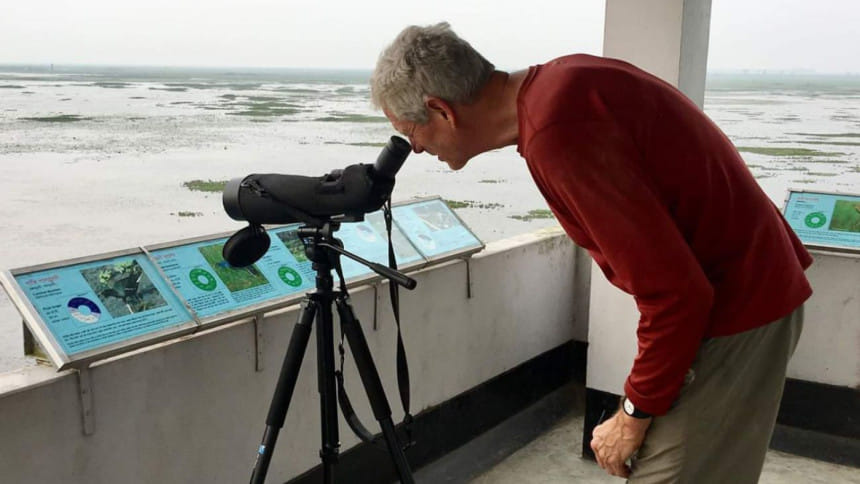Migratory birds doubled at Baikka Beel this year

Compared to last year's count, the number of migratory birds has more than doubled this year at Baikka Beel -- a bird sanctuary spread over 1,000 hectares of area in Hail Haor of Moulvibazar's Srimangal upazila.
The government declared Baikka Beel a bird and fish sanctuary in 2003 with an aim to protect and restore aquatic biodiversity in Hail Haor.
According to a census conducted at the beel in last week of January, a total of 11,615 migratory and native birds were counted this year. The figure was only 5,418 last year.
A team of bird conservationists led by Dr Paul Thompson conducted the census, organised by Bangladesh Birds Club and Asian Waterbirds Census.

The birders observed that the birds arrived early this year at Baikka Beel and the number of different species of birds visiting the beel also increased this year.
Speaking with this correspondent, Dr Thompson, a member of Bangladesh Birds Club, said during this year's census, they found 39 species of migratory and native aquatic birds at Baikka Beel. Out of those, 16 are migratory bird species.
In a pleasantly surprising discovery, they counted 288 glossy ibis, locally known as Khaira Kastechara, at the beel. In 2018, they found only two of the birds there. The first time they came across the bird in Bangladesh was in 2013 when they counted 25.
In 2017, bird count at Baikka Beel was 10,712; 8,832 in 2016, and it was 6,991 in 2015, he added.
According to previous census reports, 10,479 birds visited the beel in 2014; 7,499 in 2013; 3,964 in 2012; 5,989 in 2011; 12,250 in 2010; 9,405 in 2009; 6,429 in 2008; 7,204 in 2007; 6,949 in 2006; and 1,174 birds came to the beel in 2005.
Moniruzzaman Chowdhury, site officer of Center for Natural Resource Studies (CNRS), said, "We have planted seeds of Palmyra palm (locally known as Taal) there [at Baikka Beel] so birds can make their nests and increase their population naturally.”
“For the last several years, we have been working there. And during the time we also planted many other trees suitable for birds," he also said.
Swapan Deb Sajal, director of Sreemangal-based Bangladesh Bonyo Prani Seba Foundation, however, said the number of birds visiting the beel would grow higher if rampant poaching of birds and fish could be stopped.
He also expressed fear that many bird or fish species may go extinct due to the use of poison traps by poachers.
Contacted, Sreemangal Upazila Nirbahi Officer Nazrul Islam said steps would be taken to guard against the poachers for ensuring proper environment at the sanctuary.

 For all latest news, follow The Daily Star's Google News channel.
For all latest news, follow The Daily Star's Google News channel. 



Comments